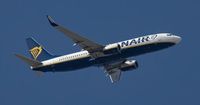Holidaymakers traveling from Barcelona to Porto on August 10, 2025, found themselves at the center of a dramatic mid-air incident when the pilot of Ryanair flight FR4587 reportedly fainted in the cockpit. The episode, which unfolded at 8:19 a.m., saw the aviator lose consciousness while navigating the Boeing 737-800, registered as 9H-QEH, en route to Portugal. According to Portugal’s National Institute of Medical Emergencies, the pilot suffered what was described as a “rapidly recovering syncope”—a sudden, brief loss of consciousness—but managed to regain composure before the plane’s scheduled landing.
Passengers aboard the budget airline’s service from Barcelona’s El Prat Airport to Porto’s Francisco Sá Carneiro Airport were likely unaware of the unfolding crisis. Despite the alarming situation, the flight continued on course, and the aircraft touched down safely at Terminal 1 of Porto Airport at precisely 8:35 a.m., as scheduled. Emergency services were already on standby, having been alerted to the in-flight medical scare.
Upon arrival, the plane was met by an ambulance from the Moreira da Maia Fire Department and a medical emergency vehicle (VMER) from Pedro Hispano Hospital. Medical personnel boarded the aircraft to attend to the pilot, who, according to the National Institute of Medical Emergencies, received immediate assistance on-site. Remarkably, the pilot declined hospital treatment and chose to remain at the airport, apparently well enough to avoid further medical intervention.
Ryanair, Europe’s largest low-cost carrier, moved quickly to reassure the public and its passengers. A spokesperson for the airline told Portugal Resident and The Mirror, “Ryanair has procedures and training in place to deal with situations where a pilot becomes unwell in flight. This flight from Barcelona to Porto (10 Aug), landed safely at Porto Airport.” The airline emphasized that the incident was managed according to strict safety protocols, and there was no disruption to the flight’s schedule or the safety of those on board.
While the incident may sound like something out of a Hollywood thriller, aviation experts note that commercial airlines are well-prepared for such emergencies. All commercial flights are staffed with at least two qualified pilots, and comprehensive training ensures that the crew can respond swiftly should one pilot become incapacitated. In this case, the swift recovery of the affected pilot meant that the backup procedures were not fully enacted, but the presence of trained staff and established protocols provided a critical safety net.
According to Portugal Resident, a source from the National Institute of Medical Emergencies confirmed, “The pilot received assistance on the spot, but refused to go to the hospital and stayed at the airport.” The source further clarified that the incident did not disrupt airport operations or the onward journeys of the flight’s passengers.
Flight data reviewed by The Mirror and cross-referenced with airport records confirm that flight FR4587 was the only Ryanair service arriving from Barcelona at Porto’s Francisco Sá Carneiro Airport on the morning of August 10. The aircraft landed without delay, and all passengers disembarked safely. For many, the only hint of an unusual event may have been the presence of emergency vehicles on the tarmac.
This episode comes at a particularly sensitive time for Ryanair and the broader European aviation industry. Just days before the incident, baggage handlers working on Ryanair services announced plans to strike, raising concerns about potential travel disruptions for thousands of summer travelers. The UGT union, representing ground staff, revealed that industrial action would begin on August 15, threatening delays and cancellations across major Spanish airports.
Adding to the uncertainty, a second wave of strikes was announced by Menzies, a ground services provider that works with several major airlines, including British Airways, easyJet, Wizz Air, American Airlines, Turkish Airlines, Emirates, and Norwegian. Menzies staff are set to walk out at five Spanish airports—Barcelona-El Prat, Alicante, Palma, Malaga, and Tenerife South—on August 16, 17, 23, 24, 30, and 31. The dual strike actions are expected to affect baggage handling and ground operations, compounding the challenges faced by airlines and passengers alike.
For Ryanair, the timing could hardly be worse. The airline, which has built its reputation on punctuality and low fares, is now grappling with both labor unrest and the public scrutiny that follows any in-flight medical emergency involving cockpit crew. However, Ryanair’s swift and transparent response to the August 10 incident has been widely noted. By confirming the facts and emphasizing the robustness of its safety procedures, the airline has sought to maintain confidence among travelers during the busy holiday season.
Industry analysts point out that pilot incapacitation, while rare, is a scenario for which airlines rigorously train. Regulations require that pilots undergo regular medical examinations, and flight crews are drilled in emergency response protocols. In the vast majority of cases, incidents are managed without incident, and passengers remain blissfully unaware of any drama unfolding behind the cockpit door.
The August 10 event serves as a reminder of the human element at the heart of commercial aviation. Even the most experienced and well-trained professionals can experience sudden health issues. The key, as demonstrated on flight FR4587, is preparation, teamwork, and the ability to respond calmly under pressure.
As the summer travel season continues, passengers flying with Ryanair and other carriers are being urged to stay informed about potential strike-related disruptions, especially at Spanish airports. The UGT union has warned that the strikes could lead to longer wait times for baggage and possible flight delays, particularly on the days when industrial action is scheduled. Menzies’ involvement, covering a wide range of airlines, means that the impact could be felt far beyond Ryanair’s own network.
For now, the safe landing of flight FR4587 stands as a testament to the resilience of airline crews and the effectiveness of established safety procedures. As one official source from Portugal’s EKAB told the Portuguese agency Lusa, the plane “landed normally,” and the situation was handled professionally from start to finish.
Travelers may never know just how much goes on behind the scenes to ensure their safety at 30,000 feet. But for those on board Ryanair’s Barcelona-to-Porto service on August 10, the professionalism of the crew and the rapid response of emergency services meant that a potentially dangerous situation ended with little more than a story to tell—and perhaps a newfound appreciation for the skill and readiness of those who keep the skies safe.




